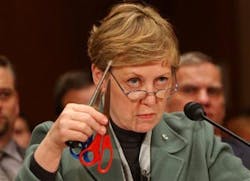TSA Defends Move to Allow Sharp Tools at Senate Hearing
The head of the Transportation Security Administration defended the agency's decision to allow small scissors and sharp tools onto planes, insisting at a Senate hearing Monday that it will make air travel safer.
"Sorting through thousands of bags a day to pull out small tools doesn't help security, it hurts it," TSA chief Kip Hawley said, explaining that the move will allow airport screeners to focus more on detecting bombs.
"The list of items that are now permitted on planes that could be turned into weapons is almost limitless," he said, citing pens, keys, belts and bare hands. "We must focus our attention on the far more dangerous threat of explosives."
His statements immediately drew some fire from flight attendants who oppose the change. Their group testified to a continuing risk of a Sept. 11-style hijacking in which terrorists armed with sharp objects could seek to take over a plane.
"Why would anyone need to bring small scissors or screwdrivers on board?" asked Pat Friend, international president of the Association of Flight Attendants, rejecting the notion that the current ban is burdensome. "Shifting resources should not be done at the expense of allowing deadly weapons back on board."
Hawley as well as the trade groups for the airline industry and flight attendants addressed the Senate Commerce Committee reviewing TSA's new security measures, which take effect Dec. 22.
Under the plan, passengers can carry on small scissors as well as screwdrivers, wrenches and other small tools, which currently make up about one-fourth of the millions of prohibited items confiscated from carry-on bags each year. Boxcutters, knives, icepicks and hammers will continue to be barred.
However, screeners will also conduct more random patdown searches. More bomb-sniffing dogs are planned, and passengers will be walking through bomb-detection machines.
Senate Commerce Committee Chairman Ted Stevens, R-Alaska, questioned the wisdom of the move. He said he was considering joining a bill being introduced by Sen. Hillary Clinton, D-N.Y., that would freeze the current list of prohibited items in place.
"The problem is this will allow more stuff into the cabin," Stevens said. "People will look at this and think I can carry anything I want."
Hawley said the changes are designed to deter terrorism partly by inserting unpredictability into the screening system, since terrorists "have at their disposal an almost limitless array of items to use in an attack."
"We will never be able to create a perfectly sterile environment," he said.
Sen. Daniel Inouye, D-Hawaii, said he agreed that new safeguards such as fortified cockpit doors have made passenger cabins safer. But he questioned whether the government and airline industry should be willing to invest more money to ensure greater safety.
"This peak travel season provides ample incentive for the TSA to attempt to streamline security procedures, and it has, no doubt, played a role in the timing," he said. "I am curious to know if the TSA would still seek these kinds of changes if their budget was not as tight."
___
On the Net:
Full list of banned items available at:
News stories provided by third parties are not edited by "Site Publication" staff. For suggestions and comments, please click the Contact link at the bottom of this page.

